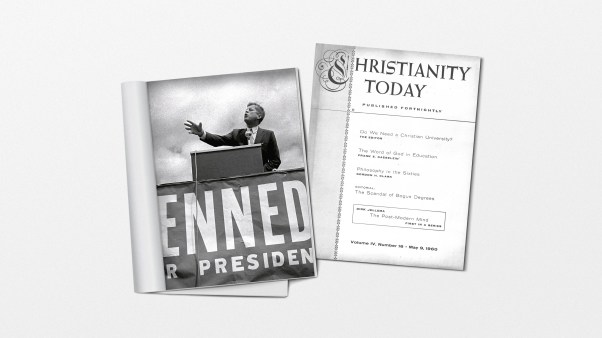What does the glowing success of Get Out—a horror film with racism at its center—say about our cultural moment? If popular entertainment serves as a kind of barometer for national anxieties, this is a highly revealing film, one that may someday hold as much interest for sociologists and historians as it does for critics.
For many Christians, the word “horror” sets off alarm bells. Isn’t this an especially deviant and heartless genre that does little more than celebrate mayhem and bloodshed? Why would Christians venture anywhere near this morbid territory?
Consider, however, that though the close kinship between the two is frequently overlooked, Christians should be the first to recognize that both horror and comedy are uniquely adept at addressing serious moral issues. One of the reasons for this is that certain subjects are so polarizing, so politically charged, and so volatile that they can only be effectively addressed by a mode of storytelling that releases their inherent tensions by detonating them in a moment of heated catharsis, like a laugh or a scream.
Indeed, laughter and screaming are frequently indistinguishable in black comedy and satire, comic sensibilities that are very familiar to horror fans. Think of the moral force of Jonathan Swift’s icy satire, “A Modest Proposal,” which famously recommended that poor Irish families supplement their meager incomes by selling their children as a particularly exotic form of cuisine to the nation’s wealthiest citizens. Though it may seem like a long way from Swift to a contemporary horror film, I’d argue that few stories address the subject of racism with the force and moral urgency of Get Out.
As I’ve argued elsewhere, all cultural artifacts are monuments to a specific time and place. Get Out arrives on the scene at a particularly tense juncture in US history, especially where the issue of race is concerned. For many of us, freshly legitimized provincialism and increasing nativism represent a stark reversal of much of the progress that has been made in the area of racial reconciliation. Specifically, the anxieties plaguing minority groups about citizenship, job opportunities, basic income, and even physical safety are escalating—and there is currently little indication that their concerns are being taken seriously. Consequently, the national mood is rife with fear and anger.
The volatile nature of our public discourse is mirrored on a more intimate level in our daily conversations and online exchanges. But painful conversations are often necessary conversations, and many of us will recognize the fact that our cultural moment, for all its toxic fear and anger, is at least forcing us to talk about issues that can no longer be ignored. At the risk of provoking more fear and anger, Get Out adds its voice to this troubling but needed conversation. In this sense, we can be grateful for the fact that it is very much a film of its time.
Get Out is the directorial debut of Jordan Peele, a man most of us know as one half of the sketch comedy duo Key & Peele. Though Peele’s affection for the horror genre may startle fans of his sketch comedy work, this movie is such an assured first effort that it will go a long way in cementing his reputation as a serious filmmaker.
A marvel of tightly controlled pacing, off-kilter visuals, and rich atmosphere, Peele’s film owes a good deal of its exquisite shocks to the claustrophobic terrors of Rosemary’s Baby and the manicured dread of Bryan Forbes’s The Stepford Wives. Peele is also mining territory that will be familiar to fans of David Lynch. Not since Blue Velvet have the idyllic scenes of the suburbs—the stately homes, the sprawling lawns, the immaculate gardens—looked so ominous and latent with menace. Here is another film that makes a convincing case for the fact that our so-called “safe places” aren’t so safe after all.
At this point, the basics of the film’s plot are fairly well known: Rose, a Caucasian woman, takes her African American boyfriend, Chris, home to meet her unassuming family. But Meet the Parents this is not, and Peele’s deceptively simple premise houses a host of sinister secrets that are best discovered firsthand.
In a recent NPR interview about the film, Peele stated, "Part of being black in this country, and I presume being any minority, is constantly being told that…we're seeing racism where there just isn't racism." Get Out masterfully dramatizes these covert strategies at downplaying racism by locating them squarely within the liberal precincts of white upper-class America, a place that prides itself on its cosmopolitan sensibilities—the very place where Chris is supposed to feel the most safe. But, as Rian Johnson explained on Twitter, “…if the movie Get Out existed in the world of Get Out, the parents would have told Chris how much they loved Get Out.” Instead, what they do tell Chris in between sips of iced tea and nibbles of hors d’oeuvres is that they would have voted for President Obama a third time if they could have, that “black” is in fashion once again, and that his genetic makeup would make him a tremendous cage fighter. Worse comments are made and Chris endures them all with touching equanimity.
As fraught as this all sounds, though, the film never gets preachy, never panders, and never telegraphs its themes to the audience. Peele’s camera simply glides through this beautiful home with its respectable owners giving voice to their respectable views, and we come to the undeniable conclusion that few places are as hospitable to hatred as these sorts of insular enclaves. Rose’s family despise Chris because of the color of his skin, but they have mastered the cultural lingo of liberal-minded America. In their hands, this language becomes something worse than propaganda; it becomes a particularly effective and covert instrument of subjugation.
The existential anguish of this culturally savvy form of persecution is given vivid expression in one of the film’s most disturbing scenes. On the pretext of curing him of his tobacco addiction, Rose’s mother hypnotizes Chris. We are then treated to a surreal vision of Chris floating away like a disembodied spirit in a pitch-black void, the room in which he formerly sat reduced to nothing more than a small rectangular opening above him. A phrase is whispered in lulling tones as he screams in terror: “Now you’re in the sunken place.” We cut to a shot of Chris paralyzed in the chair, his widened eyes filled with tears. The camera keeps reinforcing these dual aspects: Chris screaming in the void; Chris frozen in the chair, his prone body unguarded and vulnerable. In light of this scene, it is possible to retrace the film’s previous conversations, with their progressive nods and multicultural pretensions, and translate them all as, “Now you’re in the sunken place.” Subsequent viewings of the film are only more chilling.
But these microaggressions and sinister antics are only the precursors of the film’s chaotic denouement, which pushes its characters straight into grand guignole territory. The cringe-inducing dinner conversations and hallucinatory horrors soon give way to generous amounts of bloodletting as Chris is forced to turn to physical violence for his very survival. No doubt, many viewers will point to this abrupt shift in tone as a defect of the story: If Get Out begins as a chilling social satire, it ends an awful lot like a garden-variety slasher.
Though understandable, I think this is a misreading of the film. In Between the World and Me—a memoir on the experience of growing up African American in the United States that takes the form of a series of letters to his son—Ta-Nehisi Coates writes, “You must always remember that the sociology, the history, the economics, the graphs, the charts, the regressions all land, with great violence, upon the body.” The most naked expressions of animosity target the flesh, leaving visual reminders in the form of bruises, lacerations, and scars. Terms like “racism,” “marginalization,” and “prejudice” are abstract and often distance us from the very real horrors they describe. Get Out doesn’t let us hide behind these abstractions; all of its horrors “land with great violence upon the body.” In this sense, the film’s visceral conclusion is integral to its moral vision. Just as there are times when it is right to avert our gaze, so there are times when it is wrong to look away and pretend that all is well.
Flannery O’Connor once wrote, “When you can assume that your audience holds the same beliefs you do, you can relax a little and use more normal ways of talking to it; when you have to assume that it does not, then you have to make your vision apparent by shock—to the hard of hearing you shout, and for the almost blind you draw large and startling figures.” Peele has drawn large and startling figures to tell us that racism is alive and well, and that pretending our nation has moved on amounts to a moral evasion that verges on complicity. The film’s box office returns seem to indicate that audiences across America are taking his arguments seriously.
But what does a horror film with racism at its center have to say to Christians in particular? Jesus’ troubling answer to the question “Who is my neighbor?” provides us with a very holistic answer. In Luke 10:25–37, we are told of a man who is stripped, robbed, savagely beaten, and left for dead on the side of the road. Several highly respected persons catch a glimpse and quickly move on, preferring not to get involved in such a sordid affair. Finally, a Samaritan, a member of a stigmatized people group for Jesus’ Jewish audience, emerges as the true neighbor of the story because he takes the risk of looking, of getting involved, and dealing with the grave injustice before his eyes.
Notice: The Good Samaritan was only able to help because he refused to avert his eyes from the spectacle of the bloodied naked man on the side of the road—a sight most of us would wish to avoid. In this case, seeing is a precondition of healing and serving. And, as Peele’s film shows, we cannot even begin to address the scourge of racism unless we first see its vicious outworking in our lives, our communities, and finally, our country. Get Out is not for everyone, but its message that the horrors of racism must be seen in order to be healed is for every man, woman, and child on this planet.
Cameron McAllister is a writer for Christ and Pop Culture and a speaker and writer with Ravi Zacharias International Ministries (RZIM). He lives in the Atlanta area with his wife, Heather. You can find him online @cammcallister7 on Twitter and listen to him talk about signs of life in today's culture on the Vital Signs podcast.









